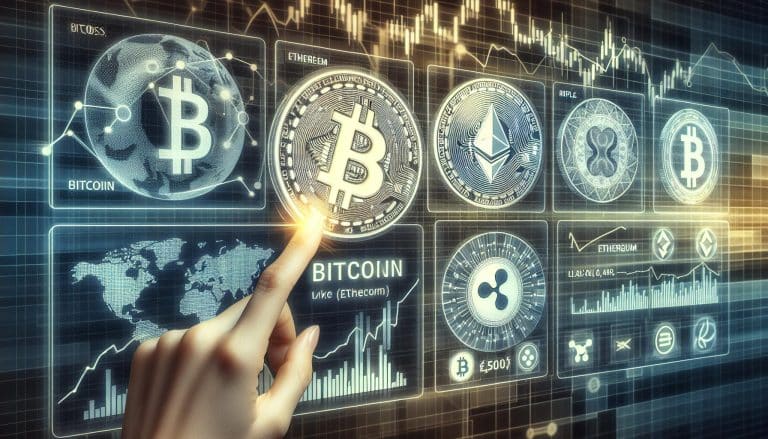SEC vs Ripple: XRP’s Impact on Crypto Regulation
Caught up in the whirlwind of cryptocurrency news? You’re not alone. The landscape is ever-changing, and it’s crucial to stay informed. One recent development that’s been making waves is the ongoing saga between the SEC and Ripple’s XRP.
This legal battle has sent shockwaves through the crypto world, stirring up questions about the future of XRP and the implications for other cryptocurrencies. The outcome could reshape the industry’s regulatory landscape.
Stay tuned as we delve into the latest updates on this high-stakes litigation, breaking down complex legal jargon into digestible insights. We’ll keep you ahead of the curve in this fast-paced crypto race.
Overview of SEC XRP Investigations
The legal skirmish between the U.S. Securities and Exchange Commission (SEC) and Ripple’s XRP isn’t just another legal case. It’s a battle that continues to influence the cryptocurrency ambience. Aligning with authoritative sources for your understanding, let’s delve into the intricacies of this litigation and examine the course of events over time.
Timeline of the SEC Involvement
The dispute commenced on December 22, 2020, when the SEC registered a complaint against Ripple Labs and two of its executives. The SEC accused them of conducting an unregistered security offering worth $1.3 billion through XRP.
Fast forward to August 31, 2021. The legal battle looked more complex as both parties clashed over the investigative process, particularly over the disclosure of legal advice Ripple received about XRP’s regulatory status.
Currently, in March 2022, the enforcement litigation still reverberates within the digital currency ecosystem. The case’s progression, capturing the attention of every sizable XRP stakeholder, underlines the market’s future and throws light on how digital assets might be seen by lawmakers going forward.
Key Players and Their Roles
Scrutinizing the key figures of the event, three actors stand out – The SEC, Ripple Labs, and the two executives. Ripple Labs, the defendant, faces charges for the allegedly unlawful offerings of XRP. The two executives – Brad Garlinghouse, CEO, and Chris Larsen, co-founder, stand accused of conducting personal unregistered sales of XRP worth approximately $600 million.
The SEC – the plaintiff, asserts that XRP is a security and that Ripple and its executives violated the securities laws’ registration requirements.
As the court proceedings continue, it isn’t simply a trial. Instead, it could potentially set a regulatory trajectory for the world of cryptocurrencies, change perspectives, and how such cases are handled in the future. It’s the larger picture that everyone invested in cryptocurrencies, XRP, or interested in ‘sec xrp news‘ awaits eagerly.
Implications of SEC Decisions on XRP
Decisions made by the SEC concerning XRP ripple can jolt the world of cryptocurrency, leaving marks not just on XRP’s price but also on investor confidence.
Impact on XRP Price
XRP’s price exhibits a yo-yo performance, entwined tightly with SEC’s decisions. When the potential lawsuit was hinted at in December 2020, XRP’s market value took a nosedive plummeting from $0.60 to $0.20 within a week. Such instances exemplify direct causal relationships between SEC rulings and XRP’s financial worth in the market.
| Period | XRP Price | Noteworthy Events |
|---|---|---|
| December 2020 | $0.60 | Pre-lawsuit |
| December 2020 | $0.20 | Post-lawsuit announcement(specifically within a week) |
This tug-of-war relationship persists even today, as observed in “XRP news today. Recently in March 2022, when positive legal commentary flooded “XRP sec news,” the token’s price again held an upward trajectory. Hence, it’s evident that SEC decisions spark volatile repercussions on XRP prices.
Influence on Investor Confidence
Another ramification of SEC decisions is its lingering impact, shaking the pillar of investor confidence. Investor perception often fluctuates with legal complexities, impacting their willingness to invest or hold onto XRP. For instance, in the immediate aftermath of the lawsuit announcement, exchanges rapidly de-listed XRP, leading to investor panic. This incident was well-noted in “crypto news XRP.”
On a broader spectrum, the SEC’s actions against Ripple have ignited debates over regulatory clarity for crypto-assets in the U.S. Many investors are watching the “XRP vs sec news” carefully, using it as a weather-vane to deduce the future climate of cryptocurrency investments. Therefore, SEC rulings on XRP not only determine investor confidence in the token but also serve as a determinant for broader cryptocurrency market sentiment.
Legal Arguments in the SEC vs. Ripple Case
Continuing from the prior discussion about the SEC’s allegations and Ripple’s reactions, we now delve deeper into the legal aspects of this contentious case. The central focus rests on the SEC’s claims against Ripple’s XRP and Ripple’s countermeasures and arguments.
SEC’s Claims Against XRP
The SEC, as per their accusations, classifies XRP as a security. Compare this, for example, with Bitcoin and Ethereum that they regard as commodities. The SEC insists that Ripple’s sale of XRP equates to an unregistered securities offering. They cite that Ripple Labs, along with its executives Brad Garlinghouse and Chris Larsen, procured more than $1.3 billion through such an unlawful securities offering.
In the SEC’s perspective, XRP’s distribution was a fundraising effort for Ripple’s business operations. This particular association, they suggest, binds XRP to Ripple’s performance as a company. Consequently, according to the SEC, XRP qualifies as a security, and Ripple’s non-compliance with federal securities laws results in their legal trouble.
Ripple’s Defense and Strategies
On the flip side, Ripple asserts a strong defense against the SEC’s allegations. Ripple’s primary argument revolves around the nature of XRP itself. Ripple contends that XRP isn’t a security. They instead affirm it as a decentralized digital asset independent of Ripple Labs. Consequently, they dispute the SEC’s claim of XRP’s direct connection to Ripple’s business performance.
Ripple’s defense delves into the history of XRP. They highlight that XRP was in circulation before Ripple Labs’ establishment, disputing their alleged fundamental role in XRP’s creation. Ripple also questions the SEC’s allegations, indicating the agency’s lack of clarity about XRP’s legal classification and decrying it as an obstacle to their operations.
Moreover, Ripple’s international defense strategy stands prominent in their legal battle. Outside the United States, many countries, including the UK, Singapore, and Japan, do not classify XRP as a security. Ripple thereby rejects the SEC’s unilateral determination and employs a global perspective to inform their defense.
Remember, the importance of these legal disagreements extends well beyond Ripple. This case holds significant implications for the cryptocurrency industry’s future, affecting many players, including exchanges, investors, and other crypto-assets.
Future of Cryptocurrency Regulation
The repercussions of the SEC’s rulings on XRP extend beyond Ripple Labs. They hint at the future contour of cryptocurrency regulation.
Predictions After the SEC’s Rulings
One cannot deny that the SEC’s decisions on XRP hold critical implications for the wider scope of cryptocurrency regulation. Of particular interest, is the impact of the SEC’s rulings on other cryptocurrencies like GME, SPY, Dogecoin, and even stocks like Tesla.
Foremost, cryptocurrency listings on popular exchanges such as Fintechzoom may be scrutinized more intensively. Regulatory bodies may demand stringent compliance, transforming the crypto industry’s operational dynamics. For instance, if the SEC affirms that XRP is a security, exchanges like Fintechzoom dealing with XRP may require a broker-dealer license.
Moreover, Ripple’s argument of XRP’s independence as a decentralized digital asset may prompt regulatory authorities to redefine what constitutes a security. There can be shifts towards acknowledging digital assets as an independent entity, eliciting drastic changes in legislation.
Finally, investor strategies could be compelled to change. If Ripple’s defense holds merit, XRP and comparable cryptocurrencies could present invigorating prospects for investors seeking diversified portfolios.
Consider the recent surge in XRP’s value, despite the SEC’s allegations.In numerous forums, including Fintechzoom, investors express their confidence in XRP, reflecting optimistic XRP news predictions for the future.
It’s clear the SEC’s rulings on XRP are poised to dictate the future course of cryptocurrency regulation. Whether that future resonates more with Ripple’s global perspective or the SEC’s claims remains to be seen. However, one thing’s for certain – whatever the outcome, it’s bound to have far-reaching effects on cryptocurrencies, exchanges like Fintechzoom, and crypto-investors alike.
Conclusion
As you’ve seen throughout this post, the SEC’s legal action against Ripple’s XRP isn’t just about one company or one cryptocurrency. It’s a pivotal moment that could redefine the landscape of cryptocurrency regulation. The SEC’s view of XRP as a security could shake up compliance requirements for exchanges and redefine securities. Ripple’s counter-argument, asserting XRP’s independence, could influence investor strategies and has shown XRP’s resilience in the face of controversy. The outcome of this dispute will undoubtedly shape the future of cryptocurrencies, exchanges, and investors alike. It’s a watershed moment that underscores the intersection of technology, finance, and law. So, keep a close eye on the unfolding events. This isn’t just about Ripple or XRP – it’s about the future of the entire cryptocurrency market.
Frequently Asked Questions
What is the central issue of the SEC’s dispute with Ripple’s XRP?
The SEC contends that Ripple’s XRP functions as a security, contrary to Ripple Labs and its executives’ claims. This stand impacts the categorization of XRP and its regulatory requirements, potentially affecting its price and investor confidence.
How does Ripple defend XRP’s status?
Ripple argues that XRP is a decentralized asset that operates independently of Ripple Labs. They argue its value does not solely hinge on the entity’s actions, signifying that XRP does not fit typical security definitions.
What broader implications does the dispute between the SEC and Ripple’s XRP have?
The SEC’s rulings on XRP potentially change compliance expectations for cryptocurrency exchanges like Fintechzoom and redefine the categorization of a security. This dispute may also influence investor dynamics and strategies.
How is XRP’s value impacted by the allegations?
Despite the legal allegations, XRP has shown resilience in terms of its value. This resilience suggests that the cryptocurrency market’s reaction to such issues can differ from traditional asset markets.
What is the future of cryptocurrency regulation based on the SEC’s stance and Ripple’s defense of XRP?
Future cryptocurrency regulation could shape differently based on whether the SEC’s view aligns with Ripple’s global perspective. The implications for cryptocurrencies, exchanges, and investors are significant, with potential shifts in compliance requirements and redefinitions of security status.






 Bitcoin
Bitcoin  Ethereum
Ethereum  Tether
Tether  XRP
XRP  USDC
USDC  Solana
Solana  TRON
TRON  Lido Staked Ether
Lido Staked Ether  Dogecoin
Dogecoin  Figure Heloc
Figure Heloc  Bitcoin Cash
Bitcoin Cash  WhiteBIT Coin
WhiteBIT Coin  Cardano
Cardano  USDS
USDS  Wrapped stETH
Wrapped stETH  LEO Token
LEO Token  Hyperliquid
Hyperliquid  Wrapped Bitcoin
Wrapped Bitcoin  Monero
Monero  Binance Bridged USDT (BNB Smart Chain)
Binance Bridged USDT (BNB Smart Chain)  Chainlink
Chainlink  Ethena USDe
Ethena USDe  Canton
Canton  Stellar
Stellar  Wrapped eETH
Wrapped eETH  Zcash
Zcash  USD1
USD1  sUSDS
sUSDS  Hedera
Hedera  Litecoin
Litecoin  Dai
Dai  Coinbase Wrapped BTC
Coinbase Wrapped BTC  Avalanche
Avalanche  Shiba Inu
Shiba Inu  PayPal USD
PayPal USD  WETH
WETH  Sui
Sui  Toncoin
Toncoin  Rain
Rain  USDT0
USDT0  Cronos
Cronos  World Liberty Financial
World Liberty Financial  Tether Gold
Tether Gold  Polkadot
Polkadot  PAX Gold
PAX Gold  MemeCore
MemeCore  Uniswap
Uniswap  Ethena Staked USDe
Ethena Staked USDe